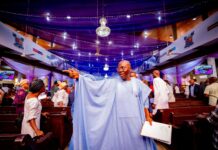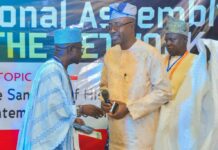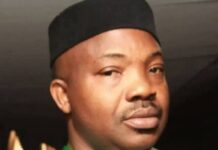
It is very cheering that the military has gained substantial ascendancy in the quest to flush out members and structures of the dreaded Boko Haram sect from many parts of the North-East region of the country. The enormous loss of human lives, loss of property and displacement of people are some of the bitter memories that the terror group will leave behind.
And right now, the government is already busy with the task of reconstruction and resettling displaced people back to their homes and make it possible for them to live normal lives again.
A very good idea.
But beyond the business of physical reconstruction, it is also high government – especially state and local government – began to undertake hybridisation of cultural and religious values among the young people of the North-East and in many other parts of the North in general.
Perhaps more than any other geo-political zone in the country, the North-East is very culturally diverse and the plurality in its society manifests in religion, tongue, class and what have you. Within such a milieu, social exclusivity will be a recipe for conflicts and mistrust.
In the post-Boko Haram era, the young population in the North-East must be taught how to better accommodate and respect the identity of others. Across the globe where terrorism has found fertile ground, there had been a pre-existing condition of exclusive cultural identity and failure to accommodate opposing identities. Making societies in North-East more inclusive is the challenge that government must meet up with in order to ensure that the orgy of terrorism and hateful bloodshed doesn’t return in the North-East.
Recently, a friend who is an expert in the reconstruction work of terrorism victims said that many of the Boko Haram foot soldiers lack routine understanding of Quranic citations and are easily hoodwinked into terrorism in the name of faith. A good example of how an illiterate mind can be a threat to peace. Of course, Islam and its jurisprudence frown at illicit spilling of the blood of the innocent – be they Muslims or non-Muslims. And, almost all non-Muslims are aware of the teaching of Prophet Muhammed that anyone who kills another human in vain is as though he had killed the whole of humanity.
I am a Muslim and I do not subscribe to the vicious killing of people of other religion in the name of God. Islam teaches that Muslims should respect the religious views of people of other faiths and, in situation where the Islamic law is abiding; Muslims authorities have responsibility of providing protection against strife and violence to non-Muslims within their authority.
In one of the authentic narrations of hadiths (teachings and practice of Prophet Muhammed) it is recorded that the prophet of Islam admonished thus: “Beware! Whoever is cruel and hard on a non-Muslim minority, curtails their rights, burdens them with more than they can bear, or takes anything from them against their free will; I (Prophet Muhammad) will complain against the person on the Day of Judgment.” (Abu Dawud)”
In another narration, during the Caliphate of Abu Bakr as-Siddiq he was reported to have given assurance of protection to non-Muslims who were residents under the Islamic caliphate. In his letter to the people of Najir, Abu Bakr as-Saddiq wrote: ‘In the Name of God, the Beneficent, the Merciful. This is the written statement of God’s slave Abu Bakr, the successor of Muhammad, the Prophet and Messenger of God. He affirms for you the rights of a protected neighbour, in yourselves, your lands, your religious community, your wealth, retainers, and servants, those of you who are present or abroad, your bishops and monks, and monasteries, and all that you own, be it great or small. You shall not be deprived of any of it, and shall have full control over it.”
There are other copious instances in both the Quran and the Hadith where the rights of non-Muslims are validly established and why it is illegal to take the life of non-Muslims, especially Christians at will.
It is thus incumbent on governments, civil rights groups and NGOs to understand that the major antidotes to religious intolerance in the North-East and, indeed, everywhere Islam is being wrongly adduced for blood spill, is the need to re-educate the young population about the authentic and pristine teachings of Islam.
In this regards, Muslim scholars and Ulamas even have a greater role to play. Islamic theologians and preachers must spread the message of peace as taught by Prophet Muhammed. They should disabuse the notion that Islam is a religion that was established through warfare or Jihad! No religion the world over had ever been established through violence. Swords and gunpowder has never conquered heart-felt beliefs of any people. There is no single example across recorded history and certainly not in the propagation of the religion of Islam.
There are countless accounts in both the lifetimes of the Prophet and the succeeding Caliphs of how Islam was widely propagated and accepted on the strength of characters of early Muslims. These accounts must be storified into mass media devices to provide an authentic and alternative narrative about the history and propagation of the religion of Islam.
When the youngsters of Islam read about the original messages of the progenitors of their faith, perhaps some of them will be inspired by the legend of Muhammed ibn Musa al-Khwarizmi who invented the Algebra – a system of arithmetic that made it possible to unlock further scientific discoveries. Or, Thabit ibn Qurra, founder of statistics and many other ancient Muslim inventors. The youngsters of Islam need to be told how early Muslims contributed immensely to the advancement of science and technology within the first millennia of the Hijrah.
The narrative of hate and blood spilling that has been associated with Islam in the past century is false. If Prophet Muhammed had told us that the pursuit of knowledge is an act of worship, then let nobody say that books are forbidden in the religion of Islam.
Olusola Sanni, a journalist, sent this piece from Ibadan.






